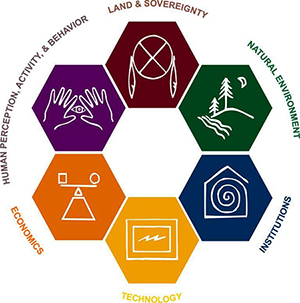
Indigenous knowledge, well-integrated into sustainability work enriches both western science understanding of the natural world and its phenomena, as well as tribal perspectives. When well done, everyone benefits.
Honoring Tribal Knowledge, Cultures, and Traditions
“Native American traditional teachings guide us to seek balance in the ways that we interact with all of creation’s elements: Earth, Fire, Wind, and Water.We are taught to respect the positive attributes as well as the dangers inherent in each of these elements.We believe that a lack of respect for the natural world has led our global societies to the brink of disaster. Our hope is that humankind will be able to pull back from disaster by growth towards embracing the traditional teachings of the Indigenous Peoples of the world. This can be effective on a local, regional and global scale.”
Incorporating the knowledge and voices of tribal members are integral to understanding sustainability. Indigenous or traditional knowledge includes an extensive understanding of local environments, including oral history, cultural perspectives, and observations of the interrelationship of humans, plants, and animal species and the land, water, and air essential to life.
In light of considerable federal and state resources received, universities owe a great deal to society. This commitment to society along with the emergence of service-learning approaches to teaching, the advancement of community-based research approaches, and resources are of significant benefit to the wider citizenry. Service and engagement activities at U-M involve mutually beneficial partnerships to enrich our teaching and advance our research, to address issues of social justice, to stimulate economic activity, to enhance democracy, or to achieve a range of other possible goals.
“On a research and scholarship level, U-M research teams are fostering more collaborative, mutually beneficial partnerships by linking U-M faculty across our campus with traditional knowledge experts. Among the student population, the university is increasing its recruitment activity to attract more Native American undergraduate and graduate students to our campus. Overall, the university is actively strengthening relationships with tribal partners in Michigan, the Great Lakes region, and throughout the U.S.&rdauo;
Indigenous leaders provide perspectives about sustainability that are critical to improving understanding of the needs of many communities. According to the Bureau of Indian Affairs, more than 56 million acres of land is managed by tribal governments.Rivers, lakes and other natural resources cross tribal, international, public and private boundaries.
The academic community is in a good position to facilitate partnerships across many sectors. Research partnerships can be the point of intersection between educational practices and developments in multiple disciplines, an intersection that leads to productive public scholarship.Examples of tribal partner engagement include involvement on collaborative research teams that co-produce knowledge, participating in community-based student-led fieldwork projects; serving as members of U-M Advisory Boards; and as expert speakers for sustainability events on campus.
Through the activities it manages, the Graham Institute supports faculty and students seeking a greater understanding of indigenous values, knowledge, and perspectives, and incorporating them into sustainability science and outreach. Tribal partners contribute to a richer understanding of the intersection of critical sustainability topics and healthy communities, such as the impact of changes in water and air temperature on fish and plant species.
“Indigenous knowledge, well-integrated into sustainability work enriches both western science understanding of the natural world and its phenomena, as well as tribal perspectives. When well done, everyone benefits.”
Assessing and Communicating Risk
Addressing the needs of indigenous communities and advancing the field of sustainability includes providing information about changes in air and water temperature, fluctuating Great Lakes water levels and public health impacts of extreme heat. Using information (historical and future projections) to assess the risk to culturally significant species, such as black ash and wild rice, and threats to economic assets such as tribal forests and fisheries can inform planning efforts focused on adapting to risks.
Examples:
- Advancing Climate Adaptation Initiatives for Indigenous Tribes within the Great Lakes Region
- Inclusion of Climate-Change Effects on Lake Levels in Management Plans of Tribal Fisheries
- Great Lakes Integrated Sciences and Assessments (GLISA)
“We passed along what we learned about plausible lake level futures, with the hope that [tribal partners] could blend these two approaches as they continued in their work.”
Tribal Leaders Contribute Expertise
U-M faculty are actively inviting Tribal members interested in gathering and sharing stories about the progress and challenges of environmental changes to participate in events. Seminars and panels are opportunities to provide a more holistic perspective of sustainability science and engagement. One example is the Heritage Seed project meetings. During the event hosted by the MBGNA and LSA, U-M leaders incorporated traditional practices (seating arranged in a talking circle and a smudging ceremony to open the meeting) and ensured that tribal participants were at the center of activities and discussions.
Examples:
- Heritage Seeds project article, Sustaining Lifeways and Anishinaabe Partners
- A summary of the Heritage Seeds for Sustaining Lifeways project
- Water Center event, with panelist Frank Ettawageshik, Executive Director of the United Tribes of Michigan, who addressed cultural, spiritual, and other values of the world’s ecosystems
- Detroit Bicentennial Event, with Ettawageshik, U-M alumni and one of the event speakers
Community-based participatory research is crucial to building knowledge and producing benefits for faculty, students, and communities.Preparing students for a global society is in alignment with the university’s commitment to diversity and our belief that the encounter with diverse people, experiences, and perspectives is critical to intellectual development and progress.
Learn More:
- Native American Studies – LSA
- Indigenous Resources – UM Library
- Native American Law Students Assn. – Law
- American Indians at U-M
Note: *See additional information about the model, Sustainable development education, practice, and research: an indigenous model of sustainable development at the College of Menominee Nation, Keshena, WI, USA